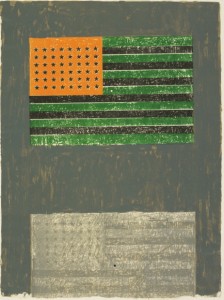
Johns, Jasper (b. 1930) © VAGA, NY
Flags. 1968. Lithograph, printed in color, irreg composition: 34 5/8 x 25 7/8″; irreg sheet: 34 5/8 x 25 7/8″. Gift of the Celeste and Armand Bartos Foundation. (291.1968)
Location: The Museum of Modern Art, New York, NY, U.S.A.
Photo Credit: Digital Image © The Museum of Modern Art/Licensed by SCALA/Art Resource, NY (ART193346)
In what has become something of an American tradition, President Barack Obama asked us to rediscover a “spirit of service” in his Inaugural Address. “At this moment,” Obama intoned, “it is precisely this spirit that must inhabit us all.” We must even be prepared to “brave…icy currents” and “endure what storms may come.”
Where might such a noble spirit come from? Obama does not say, and for good reason. Any serious reflection on what might sustain such courage and solidarity would compel Obama to rethink the role of religion in American politics.
President Obama has a complicated relationship to orthodox Christianity. On the one hand, his political career has been inspired by the civil rights movement. But, on the other hand, Obama has been a harsh critic of the very religious passions and dogmas that inspired the civil rights campaign, not to mention abolitionism and campaigns for democracy abroad. As the president has put it, “I am very suspicious of religious certainty expressing itself in politics.” Religion, in Obama’s account, should come “with a big dose of doubt.” Christians in particular should question the sanctity of human life, the reality of salvation and damnation, and the knowledge of God’s favor and providence.
Obama recognizes that Christianity has sometimes changed the world for the better. He just doesn’t imagine that its progressive powers have anything to do with dogma or certainty. Reflecting on his admiration for the black church, Obama praised “the power of that culture to give people strength in very difficult circumstances” (my emphasis). For Obama, the transformative power of religion lies in a certain sort of culture or community or tradition. Social progress does not depend on dogmatic conviction.
It has long been the great hope of liberals that somehow a deracinated and disenchanted Christianity could still give life to the sort of sacrificial spirit that Obama wants to summon. Liberals, however, have not always been so sanguine about the death of religious zealotry. John Dewey, in particular, appreciated the power of traditional faith to inspire sacrifice. Dewey insisted that liberal progress had to be driven by something like religious ardor. In A Common Faith, Dewey speculated, “Were men and women to be actuated…with the faith and ardor that have at times marked historic religions the consequences would be incalculable.” Dewey further identified the absence of such crusading faith as the “crisis of liberalism.”
The civil rights movement vindicated Dewey’s anxiety about liberalism. As the historian David L. Chappell demonstrated in his brilliant book, A Stone of Hope: Prophetic Religion and the Death of Jim Crow, the civil rights movement was inspired by a deep prophetic faith rather than liberalism in the tradition of Locke, Mill, and Dewey. Christianity succeeded where liberalism failed, according to Chappell, because the latter lacked a “basis for solidarity and self-sacrifice.” From this important insight, Chappell concluded that the “irrational traditions of prophetic, revivalistic religion served the liberal goals of freedom and equality” rather than liberalism itself.
It is sometimes forgotten that civil rights activists tended to be precisely the sort of “fundamentalists” that Obama regards as dangerous. When Bayard Rustin was asked by an interviewer whether King possessed a “fundamentalist’s sense of an active, personal God,” he responded, “Oh, yes, profoundly.” According to Chappell, it was this sense among the civil rights activists that an immanent God was on their side that held them together in the face of the dogs and fire hoses.
More contemporary evidence suggests that a sacrificial spirit still depends on religious conviction and observance. Economist Arthur C. Brooks has found a large and growing charity divide between religious and secular Americans. In Who Really Cares, Brooks concluded, “I have never found a measurable way in which secularists are more charitable than religious people.” This finding has still not been seriously disputed. The charity divide has also been growing, apparently because believers reduce their giving less during economic recessions. Even Ronald Sider’s The Scandal of the Evangelical Conscience could not help but praise deeply religious evangelicals for their remarkable charity. Their distinctiveness led Sider to conclude, “One way to end the scandal of contemporary Christian behavior is to work and pray fervently for the growth of orthodox Christian belief in our churches.”
Despite such evidence, Obama is partly right. Religious certainty has also been responsible for social injustice (though no more than secular certainty). Yet this critique only obscures a more complex reality: injustice has not been driven by religious dogmatism and certainly, in general, it has been the result of particular religious dogmas. So if Obama is opposed to the substantive ends of some religious citizens, he should criticize them directly without damning all political reformers who are driven by deep faith.
President Obama apparently hopes a “spirit of sacrifice” will transform America without a growth in something like religious ardor. Or perhaps Obama actually possesses a more complicated view of the relationship between liberal progress and religious dogmatism. Like Dewey before him, maybe Obama really does not have much faith in the power of reason or liberalism to command civic sacrifices. It is striking, for example, just how little Obama is asking of us. The massive new spending in his budget will be paid for largely by future generations of Americans. We will leave it to them to “endure what storms may come.”
[See David Kyuman Kim’s introduction to “These things are old,” a conversation about Obama, civic virtues and the common good at The Immanent Frame.]












